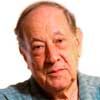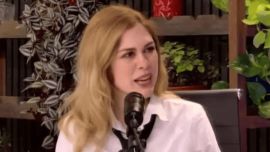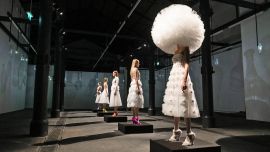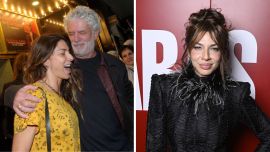The phone call early last Friday morning was from my son David. “I have news, sad I’m afraid. Andrew died.” It dredged up memories. One in particular. Disturbing, disagreeable, laughable.
It was the night of October 22, 1975. We had just moved from our offices and print shop on calle 25 de Mayo, in the red-light district, to a handsome new building close to the Casa Rosada. The editorial department was one huge space, no partitions yet and only one telephone. It began ringing.
The voice of the foreman at our old printers was both jokey and panicky. “Watch out, you are going to receive some strange visitors,” he warned. He explained that the print shop had just been raided by a group of heavily armed men in black leather jackets. After some confusion, the gunmen had realised that they had come to the wrong address. The print shop foreman, however, kindly provided the new address of the Buenos Aires Herald: Azopardo 455.
So, we were forewarned. And we waited for them calmly.
During the journey, of just a few blocks or so, the secret police in their characteristic Ford Falcons stopped to pick up a uniformed police officer, to make the expedition appear legal. This individual, an extremely rotund member of the local constabulary, came up the stairs first, puffing and blowing as he climbed. Behind him came the men with the guns and, finally, the boss. He was a very different kettle of fish. He was dressed as if he was playing a part in an early British detective film: very smart, in a tweed jacket and even carrying a vaguely Sherlock Holmes’ pipe.
He was nonplussed at first. The Herald staffers ignored their visitors and went on working as if everything was normal. I remember them all with pride. Here was Anglo-Saxon sangfroid on parade. I use both the English and French languages to describe what I consider to be the finest hour of the Herald. The staff was polyglot: a French woman born in Guatemala who was side-by-side with de Gaulle, broadcasting from London for the French Resistance, and men and women with Irish, Scottish and Welsh ancestry. Most impressive of all, Fred Marey, a German Jew who escaped the Holocaust, was soon staring down the muzzle of a machine gun. When asked what he was doing, he replied instantly, without pausing. “I’m the music critic and I have a column to finish.”
The boss, or Sherlock Holmes as I had now decided to call him, and his men were baffled. He told me that they were looking for our news editor, Andrew Graham-Yooll. He said they wanted to ask him some questions.
“No problem,” I said. “He’s off today, but I will telephone him and ask him to come in.” He said that no-one was allowed to use the telephone, but already we, not the thugs, were in control. I managed not only to call Andrew but also my wife without Sherlock or his goons even realising. Now the staff were making jokes among themselves and Eric Weil, the sports editor who had a bus to catch, walked out with his bag. He told me years later that he never even realised what was going on.
And so Andrew came in from his house in Olivos. My wife Maud and her closest friend Susana also arrived, but they were not allowed up to the newsroom.
A reporter from La Prensa turned up and he was kept downstairs. Suddenly, much to the chagrin of Sherlock, he had a very public problem on his hands. Yet he remained surprisingly good humoured about his predicament. Nobody was handcuffed and after Fred Marey had made the gunmen look foolish, the heavy arms were left lying on desks. They occupied themselves by stealing some precious papers that Andrew had hidden under the bottom drawer of his desk. He planned to document Argentina’s descent into violence with his collection of guerrilla (initially described as ‘terrorist’) pamphlets and publications.
Sherlock eventually said that he would have to take Andrew to Central Police Headquarters for questioning. He assured me that Andrew would be unharmed and that he was not under arrest. I insisted on going with him and we both rode together, under guard, in one of those legendary sinister Ford Falcons driven by what came to be known as “death squads.” We arrived to said place of ill-repute, where we both heard the sound of prisoners under torture, their screams unsuccessfully drowned out by a radio playing at full volume.
Strangely I had come to warm a little to Sherlock as we talked, on and off for an hour or so, before I joined Andrew for our journey to the heart of the beast.
It all ended well enough, for the time being, at least. When I realised that Andrew was going to be OK I went home to my wife before daybreak. He was released early in the morning.
Andrew and I rarely mentioned that night of October 22. We were both concentrating on doing our job, which we saw as reporting as much as we could about what was going on.
Andrew attended open and secret press conferences held by the Montoneros and other terrorist/guerilla movements – notably the release of the Born brothers after the payment of a US$60-million ransom. I had mixed feelings about Andrew’s contacts with them. Those contacts probably prompted the raid on the Herald, which we laughed about at the time. The newspaper’s brilliant humour columnist, Basil Thomson, wrote a glorious commentary headed: “Wot, No Tanks!”
But those meetings also led to Andrew’s appearance at the trial of Montoneros’ leader Mario Firmenich in 1982 to give evidence against him. It was a very brave thing to do and, once again, I feared for him. Especially because, when he asked me if he should appear as a witness, I had told him: “It’s the right thing to do.”
Incredibly, at the trial, he met Sherlock once again, more than 10 years after the raid on the Herald. Sherlock was now commanding a group of bodyguards assigned to protect him. During the raid on the Herald, Andrew said, Sherlock had told him that he was lucky. He had been given orders to “hacerte boleta” (in other words, kill him).
Sherlock had told a different story when we had talked all those years ago, waiting for Andrew to come to the newspaper. He said that he has been ordered to expect “a nest of terrorists” – if Sherlock had the correct address would we all have been assumed to be terrorists and randomly killed?
David Hume, a former star reporter for the Herald who also survived those times, reminded me that he came to the conclusion long ago that “Argentina is not a country, it is a state or mind.” Or, perhaps, is it a work of fiction?
Andrew and all of us who worked at the Herald during the violence of the 1970s had one thing in common. We might have been afraid – although we generally dealt with that feeling in the pit of the stomach with humour – but we were not cowards.
This yarn, as Andrew would have called it, is dedicated to his memory. He is missed already. He gave much in his 75 years, but he had much to give.
---
Pâté, Brandy, and Bombs
The title of the talk that Andrew Graham-Yooll planned to give at the Argentine Ambassador’s Residence in London on July 23 tells a lot about his exuberant approach to life. “A Liitle History of the Buenos Aires Herald: Pâté, Brandy, and Bombs” sums up what it was like to work at the newspaper during the military dictatorship.
It was, indeed, pâté and brandy that kept up our spirits. The pâté was provided by Andrew – who had a fearsome recipe requiring chicken livers and and lots of gin. I have no idea what else went into this marvellous apéritif, but I do know that it sustained us through some fraught nights.
The brandy was consumed in the bar just around the corner. It was unique, as are all the great bars in Buenos Aires, and had a unique name: “El Nido.” It was run by a family and was uniquely unique because they would prepare, for our fashion editor Madame Moulin, blanquette de veau — believe it or not— while serving the vast majority of the crowd pizza that I still dream about (and I generally am unimpressed by pizza). I remember, too, with Proust-like devotion their pastafrola.
But what powered the Herald’s audacity was undoubtedly the brandy. It was Reserva San Juan and It had the same effect on us as on the troops who discovered calvados, the potent apple-brandy, after the Normandy landings. It made us think we were invincible, fearless of the bombs that threatened us.
So let’s raise an imaginary glass of Reserva San Juan to Andrew. And let’s hope that his little history of the Buenos Aires Herald was written and recorded and that it will soon be online for all to read.


























Comments